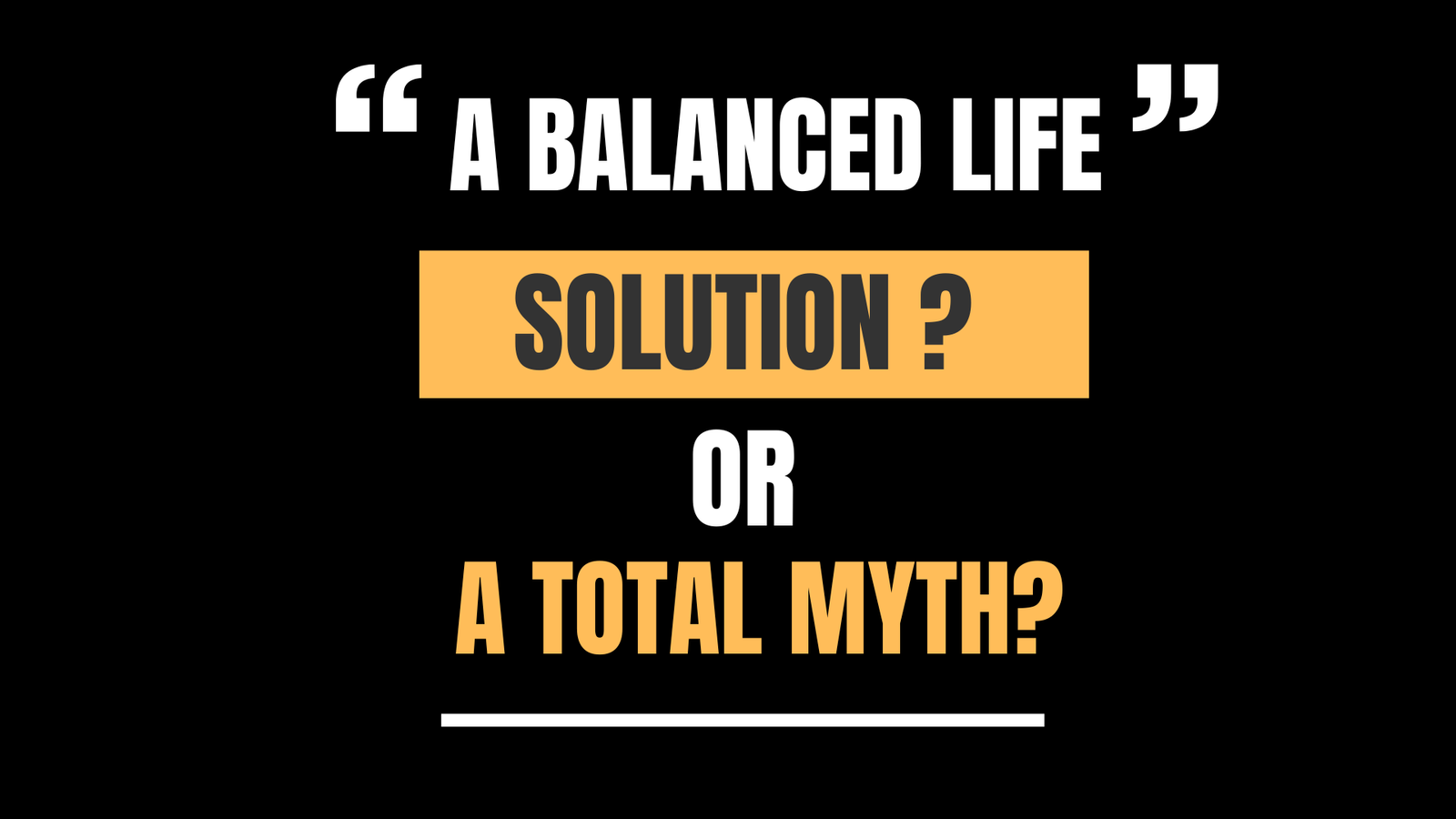Are you also indulging in chasing Nirvana of a “Balanced Life”? If Yes, take a moment to read this article.
Table of Contents
Introduction
Have you ever dreamed of having a “Balanced Life” where work, family, and fun are perfectly in sync, making life feel flawless? Or felt the pressure to achieve this perfect balance? If so, take a moment to read this article and thank me later—you’ll owe me one! We often hear about the need to balance work and personal time, stay healthy, and find harmony in our relationships. But is this idea of balance realistic or even possible? In this article, we’ll explore the myth of a balanced life and introduce the idea of counterbalancing, which might be the key to living a more fulfilling and realistic life.
Understanding the Myth of a Balanced Life
The societal obsession with balance is pervasive. We are constantly bombarded with images and messages that promote the idea of a balanced life. From social media influencers to wellness gurus, the notion that we can perfectly juggle every aspect of our lives is widespread.
In truth, Unfortunately, the “Balanced Life” we all have been striving for is a lie & doesn’t exist, life is inherently imbalanced. When you focus on what is truly important, something will always be underserved, no matter how hard you try, thee always be things left undone at the end of your day, week, month, year and life. Time on one thing means time away from another. This makes balancing impossible.
Think about your own daily routine. Are there the days when work takes up most of your time, leaving little room for family or self-care? This is not the exception but the norm. Striving for a perfect balance can lead to frustration and feelings of inadequacy. Psychologically, the pressure to balance everything can be overwhelming. It can cause stress, anxiety, and even burnout.
Idea of Counterbalancing
If achieving the balance is a lie, then what you should do? The answer is counterbalancing the things in life.
The Idea of counterbalancing is that you never go so far that you can’t find your way back or stay so long that there is nothing waiting for you when you return. Unlike the rigid notion of balance, counterbalancing acknowledges that different areas of our lives will demand varying levels of attention at different times. It’s about making conscious adjustments and shifts to manage these demands effectively. When you’re at work, give it your full attention. When it’s time to relax or spend time with loved ones, be fully present.
For example:
If you put in a couple of late nights in a row at the office to meet the deadline. Turn your phone off for the weekend and focus on spending quality time with your friends and family or catching up on a hobby. Counter balance immediately.
This approach acknowledges that while you can’t give equal attention to everything simultaneously, you can shift your focus as needed to maintain overall harmony in your life.
Why Counterbalancing Works?
Counterbalancing works because it’s realistic and adaptable. Unlike the rigid notion of balance, counterbalancing allows for flexibility. It accepts that life is dynamic and ever-changing. By regularly adjusting your focus, you can achieve success in multiple areas without the stress and guilt of trying to maintain a perfect balance.
The Consequences of Ignoring Counterbalance in Life
When you gamble with your time, you may be placing a bet you can’t cover. Even if you are sure you can win, be careful that you can live what you lose.
If you keep telling yourself let’s just work hard now and put family & other aspect of life aside, as you will have more time to fully enjoy the those things later in life?
Trust me there is no guarantee the things we push aside will be the there waiting for you when you want to come back to balance. Relationship and our personal health are two prime examples of things that wither away if a heavy imbalance remains for too long. Is there any career progression or financial gain that justifies damage to the relationship or your own health?
The impact of not counterbalancing things in life can be significant and far-reaching. Here are some key consequences:
- Burnout: Without counterbalancing, you might focus too much on one area, like work, leading to physical and mental exhaustion.
- Strained Relationships: Ignoring personal relationships while focusing excessively on work or other pursuits can cause misunderstandings and weakened connections with family and friends.
- Health Issues: Neglecting self-care and health due to an imbalanced lifestyle can result in chronic stress, poor physical health, and mental health issues.
- Decreased Productivity: Overworking without taking breaks can actually reduce productivity and creativity over time, as your brain and body need rest to function optimally.
- Lack of Fulfillment: Focusing on one aspect of life at the expense of others can leave you feeling unfulfilled, as a well-rounded life typically involves a mix of work, relationships, hobbies, and self-care.
- Missed Opportunities: By not counterbalancing, you might miss out on personal growth opportunities and enriching experiences outside your primary focus.
- Increased Stress: An unbalanced life often leads to higher stress levels, as you constantly feel the pressure to meet demands in one area while neglecting others.
Conclusion
In conclusion, The quicker you accept the concept that a “Balance Life” is a lie, the easier it will be it start living a more fulfilling and happy life. Start leading a counter balanced life right now. Embracing the power of counterbalancing allows us to navigate the complexities of modern life with more grace and less stress. By recognizing that different areas of our lives will require varying levels of attention at different times, we can lead more fulfilling and realistic lives.
FAQ’s
What is the main difference between balance and counterbalance?
The main difference is that balance seeks a constant equilibrium among life’s demands, while counterbalance acknowledges the need for dynamic adjustment and prioritisation.
Can counterbalancing work for everyone?
Yes, counterbalancing can be adapted to suit individual needs and lifestyles, making it a versatile approach for many.
How long does it take to see the benefits of counterbalancing?
The benefits of counterbalancing can be seen relatively quickly, especially in reduced stress and improved focus. Long-term benefits include greater fulfillment and productivity.
Are there any downsides to counterbalancing?
One potential downside is the need for constant adjustment, which can be challenging for some. However, the flexibility and adaptability gained often outweigh this drawback.
How do I start counterbalancing in my life?
Start by assessing your current priorities and time management. Identify areas that need more attention and be willing to make adjustments. Utilize tools and strategies to help stay organised and flexible.

